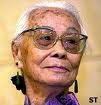Lim Zheng Yi (10)
Melissa Sim (12)
Tan Shu Ying (16)
Vanessa Kee (18)
Elizabeth Choy
A hero displays courage and the will for self sacrifice in the face of danger and adversity or from a position of weakness. That is, heroism—for some greater good of all humanity. This definition originally referred to martial courage or excellence but extended to more general moral excellence.
Qualities of a hero:
- Sacrifice-Sacrifice is the forfeiture of something highly valued for the sake of one considered having a greater value or claiming.
- Determination-Determination is a fixed intention or resolution; a firmness of purpose or resolve.
- Loyalty-Loyalty is the feeling of allegiance or the act of binding oneself to a course of action.
- Courage-Courage is that firmness of spirit and swell of soul which meets danger without fear.
- Dedication-Dedication is a selfless devotion; complete and whole hearted fidelity or the act of binding oneself to a course of action.
- Intrepidity-Intrepidity is firm, unshaken courage.
- Valor-Valor is courage exhibited in war, and can not be applied to single combats.
- Selfless-Selfless is the quality of unselfish concern for the welfare of others and acting with less concern for yourself.
- Conviction-Conviction is a fixed or strong belief; a necessity of the mind or an unshakable belief.
- Focused-Focused is the ability to direct one's energy toward a particular point or purpose; to concentrate one's energy.
- Gallantry-Gallantry is adventurous courage, which courts danger with a high and cheerful spirit.
- Perseverance-Perseverance is a persistent determination.
- Fortitude-Fortitude has often been styled "passive courage," and consists in the habit of encountering danger and enduring pain with a steadfast and unbroken spirit.
- Bravery-Bravery is daring and impetuous courage, like that of one who has the reward continually in view, and displays his courage in daring acts.
Even though Elizabeth was found out and interrogated by the Kempeitai, she did not admit being a British sympathizer. She was repeatedly tortured and starved but her psychological resilience helped her to endure the interrogations by Japanese captors. She was released only after 200 days.
A hero would face challenges like personal fear of lacking in confidence, deep personal doubts as to whether or not they are up to their challenge and physical hurdles or people bent on thwarting his or her progress.
Elizabeth Choy faced physical and mental challenge when she was imprison. Mrs. Choy, along with the other 20 or so male prisoners, had to live in those squalid conditions with very little food, ventilation and clean water. They were also not allowed to talk or move from their cross-legged seating position. Although they were not allowed to speak, the prisoners continued to communicate with each other through the use of sign language which was taught by one of the fellow prisoners.
Mrs. Choy had been brutally treated during her internment. She was subjected to beatings by the Japanese officers and was even electrocuted in front of her husband. “When my interrogators could not get any information out of me, they dragged my husband from Outram Prison, tied him up and made him kneel beside me. Then, in his full view, they stripped me to the waist and applied electric currents to me. The electric shocks sent my whole body into spasms. My tears and mucus flowed uncontrollably.” Quoted Elizabeth Choy.
References
- http://en.wikipedia.org/wiki/Hero
- http://www.mc.maricopa.edu/dept/d46/psy/dev/Fall01/hero/qualities.html
- http://historyof07.blogspot.com/2007/08/elizabeth-choythe-war-heroine-elizabeth.html
*The contents of this video below contains chinese language. However, we find the contents very meaningful


No comments:
Post a Comment